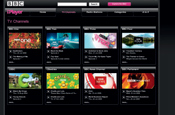Watching television on the internet is no longer the preserve of the tech-savvy. Such is the speed of uptake that broadcasters are already under pressure to deliver a service that is faster, easier to navigate and more enticing to viewers, the most recent entrant being Five's Demand Five service.
The popularity of the iPlayer has changed the game and left its commercial rivals playing catch-up. The BBC has set an extremely high benchmark, which its rivals will struggle to match without the same investment. The delay of web TV ser-vice Kangaroo - a joint venture bet-ween Channel 4, ITV and BBC Worldwide - will make the climate even tougher for the current services.
The dilemma facing VoD service providers is that the market is too nascent to yet be treated as a significant revenue stream in its own right.
Broadcasters are obliged to keep up with the times and provide content -online for viewers, but few are in a position to lure big-spending advertisers, which, understandably, are adopting a wait-and-see approach until the platform has proven itself.
Last week Five officially rolled out Demand Five, which offers a mixture of free and paid-for shows. The broadcaster's head of strategy Kieran Clifton says the service has achieved early growth, but he expects it will take some time to gather real momentum.
'At the moment we are losing money with the service and, effectively, the more popular it is, the more money we lose, whatever we do with advertising,' he says. 'VoD is a small fraction of our audience right now and we do it because we have to give viewers what they want. It also -allows us to learn about what people want to watch and when, and what they will put up with in advertising.'
In the coming years the VoD market will shift again significantly, reverting to being strongly community-based and incorporating more social networking functions, according to Clifton. 'Advertising models will change as well, and there will be an opportunity to make it more targeted and clever,' he adds.
Media agencies, too, are finding it tough to decipher the small volume of research into the VoD market when it comes to deciding whether it's a worthy sell to advertisers.
Vicky Knapp, deputy head of TV at Manning Gottlieb OMD, says the limited levels of research have had an impact on levels of advertising. 'We would hope as an industry that the next BARB -contract will include VoD figures. The iPlayer has set a massive bar in terms of how it's done, and nobody is quite up there yet. That's why the industry needs to get Kangaroo off the ground,' she says.
Graeme Hutcheson, VoD specialist at MediaCom, claims agencies would like to create more partnerships with broadcasters in the VoD space. 'Essentially, broadcasters have already bought into the content on TV, so they could buy into what's on VoD once it's a more mature market. It will never take over from TV advertising, but it could do quite well,' he says.
While it could be some time before ITV, Channel 4 and Five manage to turn a profit from VoD, research from media agency Starcom highlights that it is essential for them to remain on the platform - even after Kangaroo is launched. The research, which looked at internet television in the UK, reveals that 56% of the broadband population have streamed or downloaded video content from the internet over the past 12 months. Although YouTube serves the most -internet video, the BBC's iPlayer posted a rapid increase of users from 750,000 in January to 1.4m in April. ITV.com -attracted 36% of the market, while 4oD pulled in 32%.
The research also shows that internet TV offers high-impact advertising, because viewers are 53% more likely 'to pay attention to the ads' than on traditional TV. It identifies key areas, such as pre- and mid-roll spots, as well as sponsorship, overlays and display formats, which could work well on the platform.
A further challenge to the existing traditional VoD market has come from the hugely successful roll-out of Sky+, which Sky can rightly argue is an on-demand offering in its own right.
Nonetheless, ITV.com can point to some notable highlights on its own platform. Since August 2007, it has attracted 69m video views and overall use has inc-reased by 362% across its sites.
The VoD market may still be in its -infancy, and it may never replace the linear television offering, but its development over the coming months will make for interesting viewing - with or without Kangaroo.


